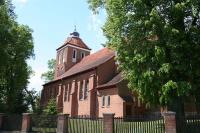My father said he would not take his ID, as he would never be a citizen of Poland
She was born on April 13th, 1946 in Bartąg, where she has lived untill today and where she went to school. Ms. Brygida had five siblings - one child died as an infant, one brother was killed on the Eastern Front during World War II. Her parents had a farm. Father was a butcher and ran a shop in the market in Bartąg, mother was a housewife. Just before the war, father of Ms Brygida was sent to prison for saying unfavorable things about Hitler. After entering Bartąg, Russians wanted to burn down the home of Ms Brygida.The father of Ms Brygida managed to save it with difficulty. After the war, the whole family stayed in Poland. Ms. Brygida quickly learned Polish and graduated from High School. Only occasionally she experienced reluctance on the part of the Polish environment. Her father, however, was a frequent subject of harassment. He had never accepted the Polish ID card. She still lives in Bartąg.
